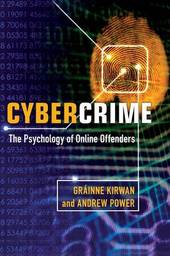
|
Cybercrime: The Psychology of Online Offenders
Hardback
Main Details
| Title |
Cybercrime: The Psychology of Online Offenders
|
| Authors and Contributors |
By (author) Grainne Kirwan
|
|
By (author) Andrew Power
|
| Physical Properties |
| Format:Hardback | | Pages:280 | | Dimensions(mm): Height 254,Width 178 |
|
| ISBN/Barcode |
9781107004443
|
| Classifications | Dewey:364.168019 |
|---|
| Audience | | Professional & Vocational | | Tertiary Education (US: College) | |
|---|
| Illustrations |
11 Tables, black and white; 12 Halftones, unspecified; 1 Line drawings, unspecified
|
|
Publishing Details |
| Publisher |
Cambridge University Press
|
| Imprint |
Cambridge University Press
|
| Publication Date |
8 August 2013 |
| Publication Country |
United Kingdom
|
Description
Cybercrime is a growing problem in the modern world. Despite the many advantages of computers, they have spawned a number of crimes, such as hacking and virus writing, and made other crimes more prevalent and easier to commit, including music piracy, identity theft and child sex offences. Understanding the psychology behind these crimes helps to determine what motivates and characterises offenders and how such crimes can be prevented. This textbook on the psychology of the cybercriminal is the first written for undergraduate and postgraduate students of psychology, criminology, law, forensic science and computer science. It requires no specific background knowledge and covers legal issues, offenders, effects on victims, punishment and preventative measures for a wide range of cybercrimes. Introductory chapters on forensic psychology and the legal issues of cybercrime ease students into the subject, and many pedagogical features in the book and online provide support for the student.
Author Biography
Grainne Kirwan is a lecturer in psychology at the Institute of Art, Design and Technology, Ireland, teaching on both the BSc (Hons) in Applied Psychology and the MSc in Cyberpsychology. She lectures in topics including forensic psychology, cyberpsychology, computer-mediated communication and the psychology of virtual reality and artificial intelligence. Her doctorate research examined the ethics, motives and interpersonal relationships of hackers. She also holds an MSc in Applied Forensic Psychology, a Postgraduate Certificate in Third Level Learning and Teaching, and an MLitt in Psychology by Research. Andrew Power is Head of the Faculty of Film, Art and Creative Technologies at the Institute of Art, Design and Technology, Ireland and is manager of the Centre for Creative Technologies and Applications. He has taught and supervised student research at both undergraduate and postgraduate level, and lectured in Universities in Ireland and the United Kingdom. Prior to his academic career Andrew worked for sixteen years in the ICT industry. His current research interests are in eGovernance, social networking and online democracy.
Reviews'Kirwan and Power have produced a truly contemporary text that shines a very bright and critical light on the relatively unexplored area of cybercrime. From the borderlands of terrestrial and cybercrime to the new world of virtual crime, this current and rapidly expanding area of academic concern is made accessible and critically comprehensible in both its new concepts and language.' David A. Holmes, Manchester Metropolitan University 'An excellent resource for behavioral scientists, lawyers and technologists alike. This will have a prominent place in my reference library.' Marcus Rogers, Purdue University 'Kirwan and Power have put together an excellent collection of chapters on the psychology of cybercrime. They provide a good mix of empirical and theoretical work which would be a useful text for any student studying the topic.' Monica Whitty, University of Leicester
|